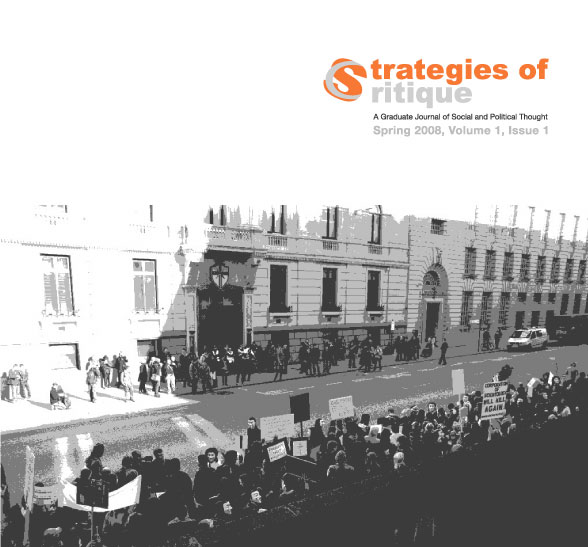Enlightenment and Repression: A Comparison of Max Horkheimer and Theodor Adorno’s Dialectic of Enlightenment and Herbert Marcuse’s Eros and Civilization
DOI:
https://doi.org/10.25071/1916-7210.15363Abstract
This paper offers a comparison of Horkheimer and Adorno’s Dialectic of Enlightenment and Marcuse’s Eros and Civilization. It is my contention that although the content of these two works differs, there is an underlying argument which is remarkably similar. Drawing mainly on the early chapters of Dialectic and the first half of Eros, I plan to demonstrate that each text explores, the intertwining and cyclical nature of progress and regression; the manner in which liberating tendencies emerge which challenge present conditions, but upon their ascension become a new form of repression; for Horkheimer and Adorno this is the development of subjectivity in the movement from myth to enlightenment, which becomes the new myth; for Marcuse, it is the instinctual repression, under the guise of ‘civilization’, required of individuals in the interest of self-preservation and propagation. Furthermore, in both cases neither enlightenment, nor the reality principle are ever fully victorious, hence this cycle is self-perpetuating.References
Horkheimer, Max and Theodor W Adorno. Dialectic of Enlightenment: Philosophical Fragments. (Stanford, Stanford University Press, 2002),
Kant, Immanuel. “An Answer to the Question ‘What is Enlightenment?’”. Political Writings. H.S. Reiss, ed. (Cambridge: Cambridge University Press, 2005)
Marcuse, Herbert. Eros and Civilization: A Philosophical Inquiry into Freud. (Boston: Beacon press, 1974)
Downloads
Published
2008-04-24 — Updated on 2008-04-24
Versions
- 2008-04-24 (2)
- 2008-04-24 (1)
How to Cite
Buckland, E. (2008). Enlightenment and Repression: A Comparison of Max Horkheimer and Theodor Adorno’s Dialectic of Enlightenment and Herbert Marcuse’s Eros and Civilization. Strategies of Critique, 1(1). https://doi.org/10.25071/1916-7210.15363
Issue
Section
Articles


